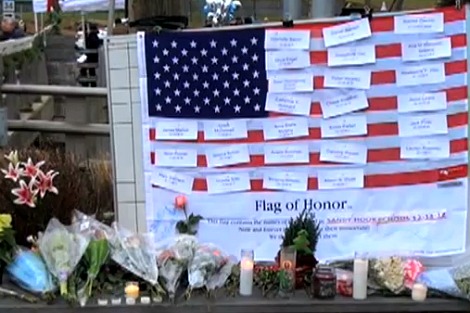 I woke up to the news on a Saturday morning. One year ago tomorrow, as we slept on this side of the world, a man walked into the Sandy Hook Elementary School in Newtown, Connecticut, and opened fire.
I woke up to the news on a Saturday morning. One year ago tomorrow, as we slept on this side of the world, a man walked into the Sandy Hook Elementary School in Newtown, Connecticut, and opened fire.
Staff in the main office heard glass breaking in the front lobby at approximately 9.35am. The gunman, later identified as Adam Lanza, shot himself in the head with a pistol around 9.40am. In the fragment between these two times, 20 first-grade students and six adults lost their lives.
I remember feeling winded in the days and weeks that followed. I stared and stared at my son, then nearly five years old. I took to cuddling him as he slept.
In the dark, holding his slender frame, I pondered the dimensions of the ammunition. Diameter 5.56mm, length 45mm. A propellant load and rifle barrel that could render bullet speeds of as much as 975m per second. In Classrooms 8 and 10, where 24 of the victims fell, a total of 130 expended casings were found.
These are the facts — the small, bloody, innocent facts — of that winter morning in Newtown, less than a fortnight from Christmas Day. While the rest of the country, and indeed the world, reeled from horror, pro-gun lobbies led by the NRA were bracing themselves for war.
The aftermath of the shootings at Sandy Hook were to follow the familiar pattern of frantic gun sales, insistent deflection toward mental illness and pop culture violence, and propagation of the theory that if someone — a 'good guy' — had had a gun at the scene, the 'bad guy' could have been easily taken down.
The shootings were a potential catalyst for gun reform. The Second Amendment absolutists, who had taken over the NRA in 1977, knew it. The right-wing commentariat, in close ranks with the NRA and the Tea Party, worked to detach policy implications from the incident. They seethed with high indignation that President Barack Obama was politicising a tragedy.
It is a peculiar way to frame the debate. For one thing, it invalidates the experience of grieving families — as if their truth mattered least or that it somehow exists in a vacuum where civilian access to military-grade weapons is irrelevant. Deaths such as those at Sandy Hook need no annotation from politicians. The policy questions present themselves against the backdrop of previous, comparable tragedies.
Moreover, the charge of politicisation never comes from the victims. In fact, the families of those murdered in Newtown, along with their supporters, launched the Sandy Hook Promise a month after losing their loved ones. It is an advocacy group that pursues common sense solutions for gun safety. They came close to helping pass the Manchin-Toomey Bill in April, which would have closed the internet and gunshow loopholes in pre-sale background checks. The shortfall was six votes.
Setting aside the ramifications of this defeat, individuals with no political experience had taken it upon themselves to engage in the legislative process. It is no more than an expression of citizenship in a western democracy, one with a modern history of mass shootings and assassinations in peacetime.
Yet the subtext to the claim of politicisation is that people are being emotionally manipulated, that they have abandoned sober judgement. This is hypocritical, of course, given that the gun lobby routinely stokes outrage and fear, holding up gun ownership as a patriotic marker and sacrosanct right. Such feelings are deemed a more legitimate guide for policy than any feelings evoked by tragedies wrought by a wayward semiautomatic.
The truth is that the high emotion that accompanies tragedies like Sandy Hook actually sharpens the facts. It places the death of innocents in its proper perspective: as evil and repugnant. If something can be done to minimise the risk of such deaths from arms, then it must be done. That is the logic of feeling.
But the idea of mitigating risk gets lost in the debate, muddied by pro-gun assertions of what works and what won't work. The self-serving view of the most voluble minority is that any limits on their access to certain types, size and volume of munitions would not work.
They do not see that that the extent of access creates the very conditions in which such shootings become likely. Of course this is the group that does not regard the estimated 88 private guns per 100 people as problematic. Nor are they particularly disturbed that the number of licensed dealers is almost five times the number of McDonald's franchises in the US. That is the status quo that they can live with.
It goes to show that the ones who complain about the politicisation of tragedy tend to be the ones who do not want to do anything about it.
 Fatima Measham is a Melbourne-based social commentator who contributes regularly to Eureka Street. Her work has also appeared in The Drum, ABC Religion & Ethics, and National Times. She tweets as @foomeister .
Fatima Measham is a Melbourne-based social commentator who contributes regularly to Eureka Street. Her work has also appeared in The Drum, ABC Religion & Ethics, and National Times. She tweets as @foomeister .